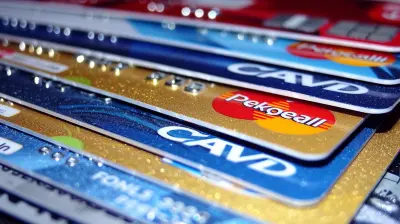How to Start Building Credit from Scratch
20 May 2025
Building credit from scratch might feel like a chicken-and-egg situation—you need credit to get credit. But don’t worry. While it may seem tricky, there are smart and straightforward ways to establish a strong credit profile even if you're starting with zero history.
A solid credit score opens doors to financial opportunities. Whether you want to get approved for a credit card, secure a loan, rent an apartment, or even land a job, your creditworthiness plays a crucial role. So, if you're wondering how to begin this journey without prior credit history, you're in the right place.
Let’s break it down step by step.

Why Does Credit Matter?
In simple terms, credit is a reflection of your financial reliability. Lenders, landlords, and even some employers check your credit to see if you’re responsible with money. A good credit score can:- Help you get approved for loans and credit cards.
- Secure lower interest rates, saving you money.
- Make renting an apartment easier.
- Sometimes even influence job opportunities.
Without credit, you’ll struggle to borrow money when needed. That’s why building it early is a smart move.

Step 1: Check If You Already Have Credit
Before assuming you have no credit history, check to be sure. Some people unknowingly have a credit file if they’ve:- Been an authorized user on someone else’s credit card.
- Taken out student loans.
- Had utility bills or rent payments reported.
You can check your credit report for free at AnnualCreditReport.com to see if you have any existing credit history. If you’re truly starting from zero, don’t worry—we’ve got you covered.

Step 2: Open a Credit Account That Works for Beginners
If you have no credit history, certain credit accounts are easier to qualify for. Let’s go through some beginner-friendly options:1. Apply for a Secured Credit Card
A secured credit card is one of the best ways to start building credit. Here’s how it works:- You put down a refundable security deposit (usually $200–$500).
- Your deposit becomes your credit limit.
- You use the card just like a normal credit card and make monthly payments.
- Over time, responsible use builds your credit score.
Once you’ve built a good history, the issuer may convert your secured card into an unsecured one and refund your deposit.
2. Become an Authorized User on Someone Else’s Card
Another quick way to establish credit is by becoming an authorized user on a trusted person’s credit card (such as a parent or spouse).- Their credit history for that card appears on your credit report.
- You don’t need to use the card to benefit.
- If the primary cardholder makes on-time payments, it positively impacts your credit.
Just make sure the person is financially responsible—if they miss payments, it can negatively affect your credit instead of helping it.
3. Get a Credit-Builder Loan
A credit-builder loan is designed specifically for people with no credit. Here’s how it works:- You borrow a small loan amount (typically $300–$1,000).
- Instead of receiving the money upfront, it goes into a locked savings account.
- You make monthly payments until the loan is paid off.
- Once it's paid, you get the money, and your payment history boosts your credit score.
Credit unions and online lenders often offer these loans.
4. Use a Student Credit Card (If You’re a Student)
If you're in college, you might qualify for a student credit card, which is easier to get approved for because it's specifically designed for young adults with little to no credit history.Student credit cards often have lower credit limits, but responsibly using one can give your credit a healthy jumpstart.
5. Report Rent & Utility Payments
Normally, rent and utility bills don’t show up on a credit report. However, some services allow you to report these payments to credit bureaus, helping you establish a credit history.A few services that do this include:
- Experian Boost (reports utility and streaming service payments).
- RentTrack (reports rent payments).
- Self Reported Credit services.
If you always pay rent or utilities on time, this can be an easy way to start building credit.

Step 3: Use Credit Responsibly
Once you’ve opened a credit account, don’t fall into the trap of misusing it. Your credit actions today determine your financial future. Follow these golden rules:1. Always Make On-Time Payments
Your payment history accounts for 35% of your credit score—the largest factor. Even one missed payment can hurt your score significantly.Set up autopay or reminders to ensure you never miss a due date. Paying at least the minimum amount is essential, but ideally, pay in full to avoid interest charges.
2. Keep Your Credit Utilization Low
Credit utilization refers to how much of your available credit you’re using. A good rule of thumb:- Keep credit usage below 30% of your limit.
- Ideally, stay under 10% for the best impact.
For example, if you have a $500 credit limit, try to keep your balance below $150 at any time.
3. Avoid Applying for Too Many Credit Accounts at Once
Each time you apply for credit, lenders perform a hard inquiry, which can slightly lower your score. Too many applications in a short period can make you look desperate for credit.Stick to one or two credit accounts initially and build from there.
4. Diversify Your Credit Mix Over Time
Having different types of credit (credit cards, loans, etc.) can improve your score. However, don’t rush into taking loans just for the sake of variety. Focus on responsible usage first.Step 4: Monitor Your Credit Regularly
Keeping an eye on your credit is essential. There are free platforms, like:- Credit Karma
- Credit Sesame
- Experian Free Credit Monitoring
These services let you track your progress and catch potential errors. If you spot mistakes on your credit report, dispute them right away.
How Long Does It Take to Build Good Credit?
If you’re starting from scratch, it may take about 3–6 months to generate a credit score. To reach a good credit score (700+), it typically takes 1–2 years of responsible use.The key? Patience and consistency. Just like building muscle at the gym, good credit requires regular effort.
Final Thoughts
Starting from zero may seem daunting, but with the right approach, building credit is entirely possible. Whether you start with a secured card, become an authorized user, or take out a small credit-builder loan, the important thing is to use credit wisely.Good credit isn't built overnight, but if you make on-time payments, keep your balances low, and avoid unnecessary inquiries, you'll be on your way to financial strength.
Remember, your credit score is like your financial report card—it reflects your money habits. So, take control today, and your future self will thank you!
all images in this post were generated using AI tools
Category:
Financial LiteracyAuthor:

Harlan Wallace
Discussion
rate this article
4 comments
Wren Jacobs
Building credit from scratch can feel daunting, but it's essential for future financial opportunities. Starting small with secured credit cards and timely payments truly lays the groundwork for a solid credit history.
June 1, 2025 at 12:55 PM

Harlan Wallace
Thank you for your insights! Starting with secured credit cards and making timely payments is indeed a great strategy for building a strong credit foundation.
Lisa Hernandez
Great insights! Excited to start my credit journey now!
May 26, 2025 at 1:02 PM

Harlan Wallace
Thank you! I'm glad you found the insights helpful. Best of luck on your credit journey!
Edward McClure
Empowering tips for beginners!
May 26, 2025 at 5:00 AM

Harlan Wallace
Thank you! I'm glad you found the tips empowering! Starting your credit journey can be exciting.
Talis Reynolds
This article provides a clear and practical approach to building credit from scratch. The tips are straightforward, emphasizing the importance of responsible credit usage and timely payments. It's a great resource for beginners looking to establish a solid credit history. Simple steps can lead to significant long-term benefits.
May 25, 2025 at 11:08 AM

Harlan Wallace
Thank you for your feedback! I'm glad you found the tips helpful for beginners in building credit responsibly.



